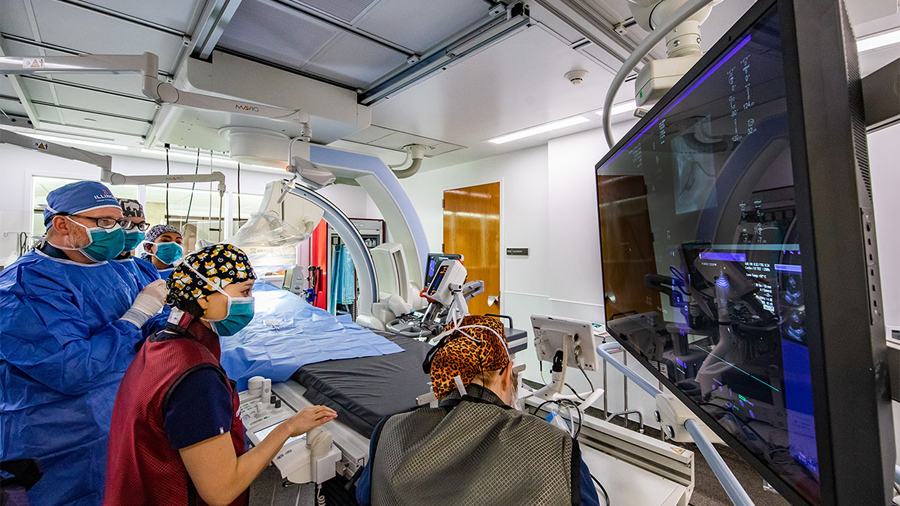This is the story of a young, female pit bull terrier that was discovered on the streets of Chicago with swelling and multiple wounds. Thanks to the efforts of a dedicated breed rescue group, Birdie got the care she needed, ultimately including several specialty services at the Veterinary Teaching Hospital in Urbana.
When she was found, Birdie was taken to the closest animal shelter. There, X-rays revealed significant subcutaneous emphysema, meaning air in the tissues under the skin, as well as air in the space between the lungs and heart. These findings indicated that Birdie might have a tear in her trachea, or windpipe, the tube that connects the larynx to the lungs.
Lucky Dog

Birdie was clearly going to need extensive care! Luckily for her, she was adopted by It’s a Pittie Rescue, which took her to a local veterinary hospital. There she received oxygen supplementation, multiple antibiotics, IV fluids, and anti-inflammatory medication.
Then Birdie started coughing more and her body continued to swell. Five days after she had been found on the streets, Birdie was brought to the University of Illinois Veterinary Teaching Hospital for intensive care and, potentially, surgery.
Emergency Care
When she arrived in Urbana, Birdie was stable but having increasing difficulty breathing. Trying to assess the respiratory status, doctors ordered chest X-rays, which showed severe subcutaneous emphysema and even more air around and between her lungs. Dr. Danielle Martindale, a veterinarian pursuing specialization in emergency and critical care, became her lead doctor. Under the care of the veterinary nurses in the ICU, Birdie was hospitalized and provided with oxygen supplementation. Birdie improved for a couple of days until her swelling and breathing problems got suddenly worse.
The care team rapidly placed Birdie under general anesthesia and conducted a CT scan, revealing multiple fractures in her head, significant air accumulation around the lungs and heart as well as in the abdomen and other tissues, and possible pneumonia. A tracheal tear was also found near the base of her neck. Dr. Arnon Gal, a specialist in internal medicine, performed a tracheoscopy that identified a defect and obstruction on the right side of her trachea.
It Takes a Team
Now it was time for the soft tissue service to review Birdie’s case. The services together felt that surgical treatment of the tracheal tear was warranted. After a discussion about the potential risks and complications of the surgery, It’s a Pittie Rescue decided to give Birdie the best shot and proceed with surgery. In surgery, a large tear of 1cm x 1.5cm was found. Surgery residents Dr. Monica Chen and Dr. Ava Song, under the supervision of faculty surgeon Dr. Sophia Topulos, removed the unhealthy portion of the trachea and sutured the ends back together.
Due to Birdie’s significant upper airway swelling, anesthetists Dr. James Cryer and Dr. Aurelian Balleydier had difficulty removing the anesthetic tube after surgery. Birdie was given steroids to reduce the swelling. Because she had already received multiple combinations of anti-inflammatory medications and steroids prior to her treatment at the U. of I., there was a risk that more steroids could potentially cause gastrointestinal perforation and make Birdie’s pneumonia worse. Fortunately, Birdie was a fighter and was able to overcome all odds.

Not Out of the Woods
Of course, Birdie decided to throw one last surprise by developing continuous accumulation of air around the lungs. For a time she required continuous evacuation of the air around the lungs, but eventually this problem was resolved.
After six days at the Veterinary Teaching Hospital, Birdie was discharged to the rescue breathing comfortably and half the size that she had been when she arrived.
Feature image above: Dr. Martindale and Dr. Chen pose with Birdie in the hospital




